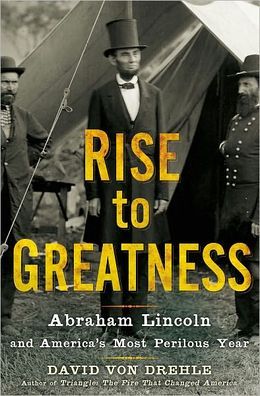Abraham Lincoln is history’s most scrutinized American. Nearly every facet of his life — his political accomplishments, ethics, religion, marriage, even his sexual orientation — has been explored in the 148 years since his assassination. What could a new Lincoln biography offer?
For author David Von Drehle, the answer lies in tracing Lincoln’s transformation from inexperienced new president of a crumbling country to steady-willed leader who saved the Union in its most vulnerable hour.
But even a story focused in this way could fill multiple volumes. So Von Drehle, a journalist and historian with impeccable writing chops, limited himself to a single year of Lincoln’s presidency — 1862, which he calls “America’s most perilous year.”
He said he chose 1862 in part because so many previous Lincoln books have dismissed its significance.
“I reflected on the way it’s understood in terms of Civil War history — as a year of failure, a year when nothing really happened,” he said recently from his Kansas City-area home. “It seems to me it was all backwards. The question was … how did the guy even survive the year, and end it so much stronger than before?”
Von Drehle makes his argument by immersing the reader in Lincoln’s daily life in 1862, starting on New Year’s Day. This simple technique offers a nearly real-time glimpse into the tumble of tragedy and tumult facing him.
We are at Lincoln’s side as he struggles to persuade, cajole and finally order his generals to use their superior numbers to bring the war to the South. We watch as the heartbroken Lincolns suffer the death of their son, Willie, his father’s favorite. We see, too, the sometimes Machiavellian efforts the president makes to keep his fragile coalition of a cabinet united around preserving the union.
Most important, we observe the evolution of Lincoln’s thinking on crucial issues of the day.
In one particularly effective scene, Von Drehle finds meaning in the incomplete thoughts Lincoln left on a scrap of paper one day in September.
“The will of God prevails,” Lincoln wrote. And despite the mounting human carnage, God “wills that (the war) should not end yet.”
But why? Lincoln’s note ends abruptly, without an answer. Von Drehle argues that in that moment, Lincoln began to believe that ending slavery was the real reason for the war. The author fast-forwards to Lincoln’s sublime second inaugural address in 1865, in which the president publicly revealed his theory: that God’s purpose in allowing the hideously bloody war to continue must have been to abolish the offense of slavery.
Back in September 1862, Von Drehle surmises, that theory led Lincoln to a decision. If the Union army could thwart a rebel invasion into Maryland, then the president would make slavery a centerpiece of the war by issuing his Emancipation Proclamation and set the stage for the final eradication of slavery in the 13th Amendment.
No matter how long you look at Lincoln, Von Drehle concedes, you never really get to his core. His levels of humanity, grace and toughness are endless. But Von Drehle, an editor-at-large for Time, puts the reader as close as anyone has to Lincoln’s mind in a crucial year.
He deftly explores Lincoln the leader as well as the man, tracing the evolution of his thinking as the full horror of the war was only beginning to make itself known.
Copy the Story Link
Send questions/comments to the editors.



Success. Please wait for the page to reload. If the page does not reload within 5 seconds, please refresh the page.
Enter your email and password to access comments.
Hi, to comment on stories you must . This profile is in addition to your subscription and website login.
Already have a commenting profile? .
Invalid username/password.
Please check your email to confirm and complete your registration.
Only subscribers are eligible to post comments. Please subscribe or login first for digital access. Here’s why.
Use the form below to reset your password. When you've submitted your account email, we will send an email with a reset code.